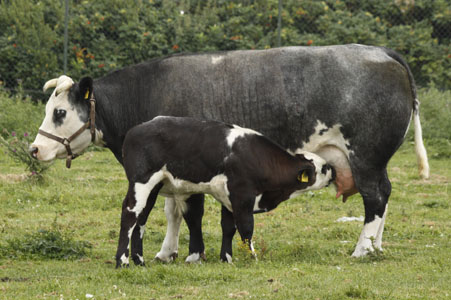- Definitions
- Compassion
- Health
- Environment
- Vegan Food Pyramid
Health

 There is no reason to drink cow's milk at any time in your life.
It was designed for calves, not humans, and we should all stop drinking it today.
There is no reason to drink cow's milk at any time in your life.
It was designed for calves, not humans, and we should all stop drinking it today.
-- Dr. Frank A. Oski, former director of Pediatrics, Johns Hopkins University.
Dairy
Cow's milk is not designed for human consumption. Whole cow's milk is designed to be the perfect food for the nutritional needs of calves. It is high in fat, protein and cholesterol, low in carbohydrates and contains no fiber.
Dairy products are the leading cause of food allergies. They contain more than 25 different proteins that may induce allergic reactions in humans. Lactose intolerance, the inability to digest the carbohydrate known as lactose found in milk, is common in about 90% of adult blacks and Asians. This condition causes symptoms like diarrhea, gas and stomach cramps.
Breastfed babies can get colic and other milk-related food allergies if the mother consumes dairy products. Colic is the common allergic reaction infants have to proteins found in cow's milk. They give the baby stomach cramps, which cause persistent fussing and crying.
So how do we get enough calcium? Check out the Nutrient Information pages for more information.
Meat
Meat contains too much fat, too much protein and no fiber. Meat is the greatest source of fat in the American diet. Excessive quantities of fat consumed are linked to heart disease, cancer, obesity and diabetes. Too much protein can contribute to calcium leaching out of the bones. Lack of fiber can cause constipation, hemorrhoids and colon cancer.
Too much protein is unhealthy, because our body does not store protein. The protein that our body does not need is broken down and excreted. However, for every molecule of ammonia or amino acid cleansed from the blood, the kidneys lose an atom of calcium through the urine. This is called "protein-induced hypercalcuria". The calcium that leaves the blood is taken out of the body's vital storehouse of calcium, the bones. This calcium loss over the years can cause osteoporosis. Osteoporosis is usually not caused by calcium deficiency, but by protein excess. Osteoporosis is most severe in people who consume the most protein.
Eggs
Egg yolks contain one of the densest concentrations of animal fat of all foods. It is made to give energy to a baby chicken for twenty-one days. When egg yolks are eaten, this concentrated fat comes into our bloodstream, raising our cholesterol, which can clog our arteries.
Egg whites contain very concentrated albumin protein. This protein can contribute to calcium leaching out of the bones, leading to osteoporosis.
Besides the fact that eggs are not healthy for our body, they can also carry salmonella bacteria. There is absolutely no reason why we should be eating eggs.
Fish
Eating fish or fish by-products can be dangerous to our health. Toxic wastes are poured into rivers and oceans and become incorporated into the biosystem. These poisons concentrate in the flesh of fish. A lot of Fish flesh has been shown to contain large amounts of heavy metals (from industrial wastes), mutation-inducing hydrocarbons (from pesticides, herbicides, dioxins, etc) and radioactivity (from nuclear pollution).
Fish flesh is very concentrated protein. Only 20 to 30 grams of protein are needed by our body each day. A large piece of fish flesh can contain more than 100 grams of protein.
Fish oils are also not good for our body, because they decrease the bloods' ability to coagulate to stop bleeding. Eskimos, who eat large amounts of fish, suffer high rates of hemorrhagic strokes, nose bleeds and epilepsy. This "blood thinning" property can be very dangerous for someone suffering a stroke, which occurs when a blood vessel in the brain bursts, and the blood fails to clot. Fish oils have also shown to inhibit the action of insulin, which makes them unsuitable for diabetics.

